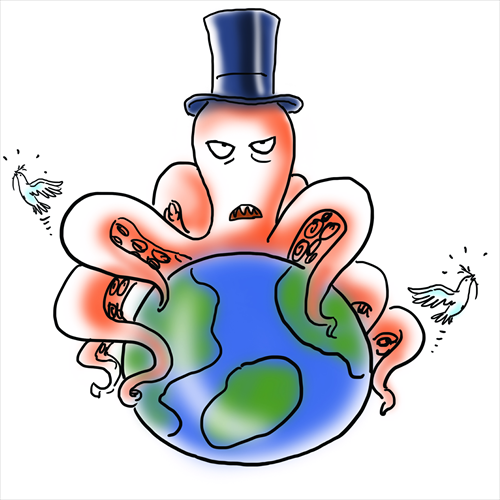Is Russia truly the one threatening peace?

Illustration: Liu Rui/GT
According to recent reports, Sweden and Finland are thinking about joining NATO as they believe that Russia is threatening peace in Europe. Is that so?
The great European politicians, Helmut Schmidt and Egon Bahr (who both died recently) as well as Mikhail Gorbachev and Claude Juncker (before his current job at EU) have all warned that we are in a pre-war situation, mainly because of the West's castigating of Russia. To prevent a war, on January 22 last year, Bahr asked for an urgent global peace conference comparable to the "Peace of Westphalia" of 1648, which put a long-lasting end to 30 years of war in Europe.
Since 2015, some US and NATO generals and in early 2016 the Swedish and Norwegian commanders-in-chief, all talked about the likelihood of a war in Europe. In the Chinese press, there was also a discussion about the "inevitability" of a war with the US, if the latter crossed a certain red line. Russia is upgrading its forces and the US is bringing additional troops to Europe. But what are the reasons for the rising tensions in Europe?
At the end of the Cold War, Russia dismantled the Warsaw Pact, but US- led NATO, originally intended to keep the Soviets at bay, did not dissolve itself, but crept closer and closer upon Russia, engulfing former members of the East Bloc and installing missile defense systems as close to it as Poland and Romania. Russia has repeatedly said that it cannot accept this growing threat on its doorstep.
In 1962, we had an exact mirror-image of today's situation. The Soviet Union had stationed a large number of its nuclear missiles on Cuba and on submarines nearby. US president John F Kennedy reacted much like the Russian government has today and made it clear that the US could not accept this threat at its doorstep and that it would resort to war if the problem could not be solved. The world faced a nuclear Armageddon. But the Soviets swiftly withdrew the missiles.
There is another example. Everybody knows that there are strong political movements in Scotland to make it an independent country, in Britain to exit the EU and in Catalonia to break away from Spain. It is easy to imagine the outcry of Western politicians and the Western media if Russian President Vladimir Putin gave his support to these movements in a speech as President Barack Obama did in a speech about Ukraine.
How would the West react if high-ranking Russian ministers and politicians went to these countries to assure the opposition of Russia's support, met the leaders of the breakaway parties to plan and finance their next steps and gave instructions to the Russian ambassadors whom they must push to become the prime ministers should new countries emerge? But nothing like this has happened. Russia did not interfere in these countries' internal affairs.
But for the West, meddling in other countries' affairs in the name of "higher values" is the norm. Any means are welcome: military intervention, supporting opposition groups, coups organized through the CIA or other secret services, through development aid and in other ways. In the very early stage of the Maidan movement in Ukraine, the powerful US Senator McCain had meetings with leaders of the opposition parties, including the fascist Svoboda, to organize US support. He addressed the Ukrainians at a rally on the Maidan to assure them of US help. US Assistant Secretary of State Victoria Nuland, in a long phone call with the US Ambassador in Kiev, told him that Arseniy Yatsenyuk has to become prime minister of Ukraine. Until a few weeks ago, that person held that position.
Many other senior Western politicians, such as Catherine Ashton in charge of EU foreign affairs, got also engaged in the uprising. Following these interventions, the elected president of Ukraine was sacked in a coup and replaced by Petro Poroshenko, owner of an economic empire. Soon talks were started of joining NATO, while Russia had an agreement with Ukraine for the continued use by its Black Sea fleet of Sevastopol, its main harbor till 1991 (the end of Ukraine's membership in the Soviet Union).
These developments led to a civil war and Crimea returning to Russia. Now, the West blames Russia and punishes it with sanctions for safe-guarding its vital security interest in a pre-war situation that is caused by the West.
The larger problem is that a new world order is beginning and the US is determined at all costs - even of a war - to remain the dominant world power.
The author is Swiss economist and business administrator. opinion@globaltimes.cm.cn